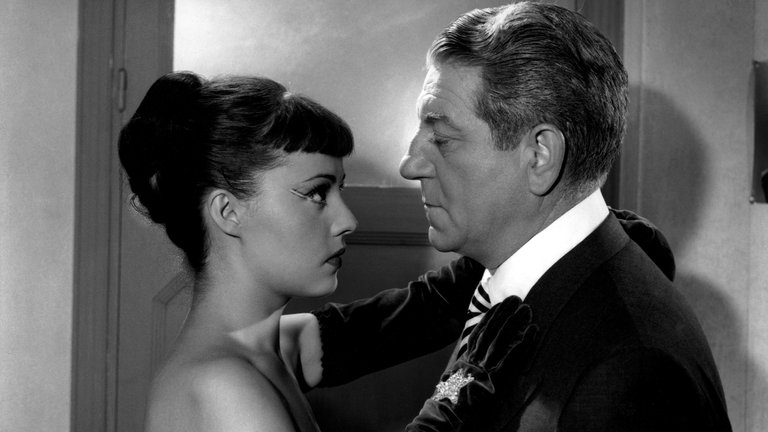Film Review: Touchez pas au grisbi (1954)

The gangster film is often perceived as an American invention, but this did not prevent other cinema industries from embracing the genre and producing classics of their own. One such industry is French, whose 1954 film Touchez pas au grisbi, directed by Jacques Becker, is one of the most celebrated pieces of 1950s cinema.
The title, which literally means "Don't touch the loot," was taken from the eponymous novel by Albert Simonin, who also co-wrote the script with Becker and Maurice Griffe. The main protagonist is Max (played by Jean Gabin), a middle-aged gangster who has through the years accumulated some money, large number of friends, respect in Parisian underworld and taste for good things in life, including beautiful women. Knowing that age might ultimately catch up with him, he decides to retire and for that very purpose he robbed 50 million francs worth of gold bar from Orly Airport. His plans are, however, disrupted due to old friend and partner Riton (played by René Dary) who blurted details of the heist to his girlfriend Josy (played by Jeanne Moreau), a showgirl. She, however, is cheating Riton with Angelo (played by Lino Ventura), young and ambitious gang boss who decides to get his hands on the loot. He abducts Riton and offers his freedom in exchange for gold bars, presenting Max with terrible dilemma.
Jacques Becker was one of the more versatile and interesting mid-20th Century authors of French cinema, who, however, wasn't that much respected by his contemporaries and earned proper stature only after his premature death at age 53. Grisbi, which represents his only foray into the gangster genre, is one of his most commercially successful and widely regarded works. At first glance, it looks like Grisbi is France's answer to Hollywood's film noir, but this could be deceiving. Film noir as a genre developed partly under the influence of Poetic Realism, a film movement that had originated in 1930s France and whose main star was Jean Gabin. Here, Gabin appears in the role that would in some way connect post-WW2 French cinema with its past while at the same time refreshing his career.
Gabin, who has built his stardom in the roles of dashing romantic heros who often met tragic ends, here plays something completely different – a survivor, an intelligent, capable, and resourceful man who appears to have made the best out of the bad hands life has given him and turned into some sort of charismatic, gentlemanly, and grandfatherly figure most women would like to have as a lover and most men would like to have as a friend. Gabin, through his charisma and talent, as well as ability to come to terms with his age, manages to make such seemingly unrealistic and over-idealised character work within the context of the underworld setting, and much of the success of Grisbi is based on him alone. Gabin adds a bit of complexity by chastising Riton over falling for women half of his age, while maintaining three such relationships himself.
Becker as a director doesn't seem to be particularly imaginative; although most of the action takes place at night, Grisbi doesn't look much like traditional film noir. Most of the film is set in well-lit and fancy-looking apartments, restaurants, and nightclubs, creating a strong impression that crime pays well, although it comes with huge risks. The pacing is slow at the beginning, but it allows for much of the character exposition and makes the audience actually care what happens to the characters when the action intensifies in a very violent finale. Gabin is helped by a very good and diverse cast, which, among others, includes future superstar Jeanne Moreau in a small role and former Italian wrestler Lino Ventura, who would later become something of Gabin's successor as a star of French gangster films.
Grisbi also benefits from an excellent soundtrack by Jean Wiener, including the title harmonica theme that introduced a melancholic atmosphere and was covered by many artists and used by Martin Scorsese in his 2019 film The Irishman. It is a gangster film that, unlike many non-Hollywood gangster films, doesn't try to be Hollywood. The underworld presented in this film is clearly the French underworld, and its makers weren’t constrained by the MPAA Production Code and had approach to underworld much more realistic than in Hollywood gangster films of its time. While the script toned down violence and some questionable aspects of Simonin's novels, more realism was seen in gangsters allowed to use submachine guns, showgirls wearing rather risqué costumes, and a lot of photos and paintings of nude women on the walls.
Touchez pas au grisbi is a classic film that earned its status and paved the way for other French filmmakers to excel in the gangster genre, including Jean-Pierre Melville, whose Bob la flambeur, a film similar in tone and theme, would start his own series of genre classics. Even by itself, it is a must-watch for any fan of classic cinema.
RATING: 7/10 (+++)
Blog in Croatian https://draxblog.com
Blog in English https://draxreview.wordpress.com/
InLeo blog https://inleo.io/@drax.leo
Hiveonboard: https://hiveonboard.com?ref=drax
Rising Star game: https://www.risingstargame.com?referrer=drax
1Inch: https://1inch.exchange/#/r/0x83823d8CCB74F828148258BB4457642124b1328e
BTC donations: 1EWxiMiP6iiG9rger3NuUSd6HByaxQWafG
ETH donations: 0xB305F144323b99e6f8b1d66f5D7DE78B498C32A7
Posted using CineTV